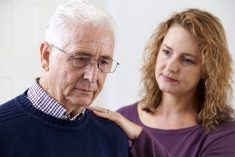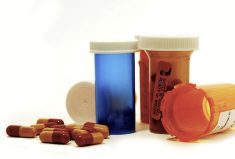A nosebleed can be both bothersome and alarming, even if you don’t know its technical name is epistaxis. Most people have at least one nosebleed between the ages of three and 30. Children younger than three usually do not have nosebleeds because they do not often experience nasal damage, and older people may have nosebleeds more often because of medical conditions and/or the medications they take.
The nose is responsible for the intake of air into the lungs, but it is lined with a rich supply of blood vessels that warm and moisturize the air along the way. The septum which separates your nasal passages is especially rich in blood vessels and most nosebleeds result from damage there.
Read Also

Summer Series: Why it’s important for you to get fit
So much of farming is so physically demanding. Even the easy jobs take enough running around to require physical stamina….
An obvious cause of nosebleeds can be trauma to the nose, such as a blow to the nose, nose “picking,” or a foreign body lodged in the nose. Dry nasal passages because of low humidity during winter months may also contribute to nosebleeds, as can upper respiratory tract infections like the common cold, or inflammation on nasal passages due to conditions like allergies or hay fever. A deviated septum may also be involved.
If you take any drugs that can thin the blood, the risk for bleeding including nosebleeds can rise. Acetylsalicylic acid (ASA) and other non-steroidal anti-inflammatory drugs like ibuprofen and naproxen are common culprits, but anticoagulants like warfarin and clopidogrel also may be implicated. A dosage adjustment may be needed. Indeed, sometimes a nosebleed is the first sign of too high a dosage.
In older people, kidney disease, atherosclerosis (hardening of arteries), and high blood pressure can contribute to nosebleeds, but often nosebleeds start on their own without any obvious cause.
About 10 minutes of direct pressure on your nose, usually just below the bridge of your nose, will help stop a nosebleed. You will want to remain upright, so sitting down is fine, but not lying down, and remember to keep your nose higher than your heart. Also remember that bending your head slightly forward will prevent your swallowing blood. A cool compress applied to the bridge of your nose may also help reduce blood flow.
If your nosebleed lasts for more than 20 minutes without any slowing of the flow, or if you have several nosebleeds without any specific cause, you need to get them checked. Some people use a nasal decongestant to shrink blood vessels, but if you are resorting to this measure, you also should have your nosebleeds checked.
When a nosebleed has resulted from trauma, an examination of the nose is usually recommended to rule out internal damage and any potential for infection. You will want to seek medical attention if a foreign object is lodged in your nose (or your child’s nose). Poking at the object or attempting to remove it may push it farther into the nose and increase the risk for inhaling it.
After a nosebleed, don’t pick at your nose or blow it hard because it could bleed again. Bending over, vigorous activity, hot or spicy food, or even smoking could also restart your nosebleed. If cold, dry air is problematic, lubricating your nasal passages, especially your septum and increasing the humidity at home or work will reduce your risk for nosebleeds.
Don’t ignore nosebleeds or take them for granted. Your blood loss could be significant, leading to anemia, or your nosebleeds could be a sign of an underlying cause. A bloody nose can be bothersome, but it could be the sign of something else as well.
Marie Berry is a lawyer/pharmacist interested in health and education.














